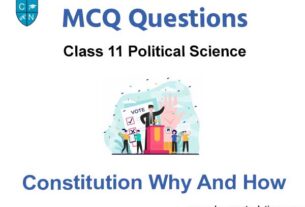Check the below NCERT MCQ Class 11 Political Science Chapter 3 Equality with Answers available with PDF free download. MCQ Questions for Class 11 Political Science with Answers were prepared based on the latest syllabus and examination pattern issued by CBSE, NCERT and KVS. Our teachers have provided below Equality Class 11 Political Science MCQs Questions with answers which will help students to revise and get more marks in exams
Equality Class 11 Political Science MCQs Questions with Answers
Refer below for MCQ Class 11 Political Science Chapter 3 Equality with solutions. Solve questions and compare with the answers provided below
Question. The demand for legal equality was raised in:
(a) 17th century
(b) 19th century
(c) 18th century
(d) 20th century.
Answer
C
Question. Who said equality is the preferred value?
(a) Aristotle
(b) Plato
(c) Burke
(d) Hegel
Answer
B
Question. The statement that. “Men by nature are equal” is given by:
(a) Hobbes
(b) Locke
(c) Rousseau
(d) Laski
Answer
B
Question. Some of the left parties in India are
(a) CPI, CPI(M), All India Forward Bloc
(b) CPI, RSS, Congress
(c) Socialist Party, Oppressed Peoples Party, VHP
(d) BJP, RJD, All India Forward Bloc
Answer
A
Question. The purpose of Feminism is
(a) To weaken women
(b) To empower women
(c) To exploit women
(d) None.
Answer
B
Question. Which of the following statements is correct?
(a) Liberty and Equality are opposed to each other
(b) Liberty and Law are opposed to each other
(c) Liberty and Equality are supplementary
(d) Liberty and Equality are contradictory
Answer
C
Question. Choose the option which is being adopted in India to minimize and eliminate entrenched forms of social inequalities.
(a) Separate religious places for disadvantaged communities
(b) Policy of quotas in education and jobs.
(c) Free education
(d) Separate hospitals
Answer
B
Question.For Marxist the fundamental equality is:
(a) Social equality
(b) Political equality
(c) Economic equality
(d) Legal equality
Answer
C
Question. The Sixth Five Year Plan gave the status of partners in development to
(a) Dalits.
(b) Tribals.
(c) Urban youth.
(d) Women.
Answer
D
Question. Campaign for equality
(a) is a movement against death penalty.
(b) is women’s rights movement in Iran.
(c) seeks rehabilitation for Katrina survivors.
(d) is meant for the victims of terrorism.
Answer
B
Question. In which country ‘Apartheid’ prevailed?
(a) Britain
(b) USA
(c) South Africa
(d) France
Answer
C
Question. The demand for legal equality was raised in:
(a) 17th century
(b) 19th century
(c) 18th century
(d) 20th century
Answer
C
Question. In the sphere of religion, the Indian state policy
(a) Maintains principled distance.
(b) Promotes and protect the majority religion.
(c) Believes that religion is a private affair and religious ceremonies should not be allowed in public.
(d) Is to press forward the religious ideology of ‘Hindutava’.
Answer
A
Question. Who is associated with ‘Communism’?
(a) Hegel
(b) Marx
(c) Rousseau
(d) None
Answer
B
Question. Amnesty international is an example of
(a) Social diversity.
(b) Biodiversity.
(c) Cultural diversity organisation.
(d) Civil liberties organisation.
Answer
D
Question. In US, the case for racial preferences in student admissions is made on the argument of:
(a) Uniformity.
(b) Equality.
(c) Diversity.
(d) Fraternity.
Answer
C
Question. The statement that “Men by nature are equal” is given by:
(a) Hobbes
(b) Locke
(c) Rousseau
(d) Laski
Answer
B
Question. Ambedkar and Gandhi both championed the cause of untouchables, but they could not agree on
(a) Reservations in the private sector
(b) Reservations
(c) Role of judiciary
(d) Role of cottage industry
Answer
B

We hope you liked MCQ Class 11 Political Science Chapter 3 Equality with answers provided above. In case you have any questions please post them in the comments section below and our Political Science teachers will provide a response.

